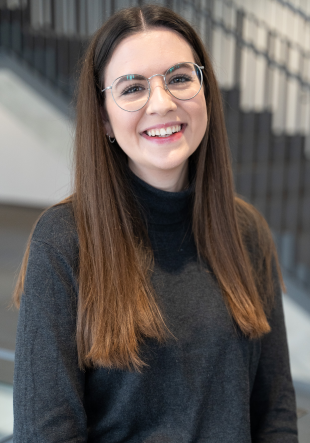Before Clara-Vivian Ammann decided to study business education, she was already familiar with the tools of a business economist from her vocational training. Today, she is researching how an exchange about the implicit ways of working and thinking in specialist cultures can be organised in learning environments. The exchange is intended to reduce inequalities between students and counteract educational barriers.
Purchasing, sales and controlling - Ammann was already very familiar with these areas before starting her Master's programme at Paderborn University. After graduating from high school, her path led her to a dual study programme with vocational training, further training in business administration and a traditional bachelor's degree in business administration. However, the practical orientation of her previous stations in life was not enough for her: ‘I wanted to gain an educational perspective on my previous business experience and help shape educational processes.’ With the Master's degree programme in Business Education, the business economist was able to build on her business knowledge and gain a new perspective on professional teaching and learning.
For her, her everyday life as a doctoral student today reflects many facets of the ‘typical activities of a business educator’: research, project work, attending conferences, advising students, being involved in teaching and supervising theses. For Ammann, working in conjunction with research activities means ‘lifelong learning’. Although she can build on her previous methodological and specialised knowledge, she still encounters new hurdles every day that need to be overcome. She currently sees her biggest challenges in juggling her interests and tasks as well as sorting out the many options as a doctoral student and research assistant: ‘Personal responsibility and discipline are even more important than before.’
Despite the new working structures following her studies, Ammann is passionate about her work in the research project and is bursting with energy. She is involved in the DigiSelF research project, in which researchers from all disciplines at Paderborn University are using their experience of digital distance learning to develop modern concepts for learning, teaching and testing. In her sub-project, Ammann is working with her colleagues from the Department of Business and Vocational Education and Psychology to develop a higher education didactic programme for dealing with subject cultures and implicit aspects of academic practices determined by subject culture. It is about the invisible rules of a subject area. Which performance assessment criteria are used in physics, for example, and which in economics? What teaching practices and pedagogical thought patterns exist in psychology or mechanical engineering? Student Culture Fellows deal with the implicit rules of the subject areas as part of a training programme and accompany events and learning opportunities in the introductory phase of studies. The Culture Fellows mediate between students and lecturers by helping to recognise and open up the unspoken, subject-specific practices. The aim is to make the so-called rules of the game accessible to students and, in the long term, the project is intended to provide impetus for further development. As part of her dissertation, Ammann is focussing, among other things, on evaluating the training of the student Culture Fellows.
‘A doctorate is probably a challenge for everyone,’ surmises Ammann. At the same time, she sees her doctoral studies and involvement in the research project as an opportunity to continue to grow and remain part of university life after completing her degree. Ammann has found her great passion in researching, learning and teaching at Paderborn University and is passionate about her research focus - even if she doesn't always find everything ‘easy-going’. Despite the challenges, Ammann enjoys the ‘special feeling’ at the Faculty of Business Administration and Economics. She does not have a concrete plan at the moment. Instead, the young researcher is trying to familiarise herself with the path between free enterprise and an academic career: ‘Over the next few years, I'll just see where it takes me and what I'm passionate about.’ This attitude has worked well for Ammann so far and led her to her ‘right university’, among other things. She is certain that her path will take her to the right places, even without a concrete plan: ‘When I was at school, I always expected to feel that I was finished after my studies. But new doors kept opening up and I now really enjoy learning new things and finding my feet.'
You want that too?
We are one of the few faculties in Germany to offer a structured doctoral programme. This enables you to deepen your specialist knowledge to the extent of 30 ECTS credits and thus acquire the tools for your research activities.

